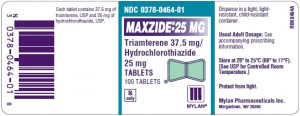Warnings & Recalls for Maxzide
Maxzide and Pregnancy
The U.S. Food and Drug Administration has listed Maxzide as a
pregnancy Category C drug. Maxzide has not been studied in women who are pregnant and the effect is not completely know. If you are pregnant or may become pregnant,
discuss your options with your doctor to determine if the benefits outweigh the risks of taking Maxzide. This medicine can be passed through breast-milk to a nursing baby; therefore women
should not take Maxzide while breastfeeding.
General Warnings
Do not use Maxzide if you are allergic to triamterene and hydrochlorothiazide. Let your healthcare provider know about any pre-existing medical conditions you may have including:
- any medicines, supplements or herbal products you are using
- allergies
- any liver disorders you may have
- diabetes
- kidney problems, disease or kidney stones
- gout (a type of arthritis)
- systemic lupus erythematosus (lupus disease)
- heart failure, arrhythmia or irregular heart rate
- if you are dehydrated, electrolyte deficiencies, low amounts of folic acid in the blood or raised blood acid levels
- if your are required to be on a low-salt diet
Patients should know that Maxzide may cause dizziness and affect your ability to perform certain activities. Avoid hot temperatures, direct exposure to sunlight, and standing up quickly. Be aware that Maxzide may increase the risk of vision problems or angle-closure glaucoma; contact your doctor at once if you notice any eye problems. Maxzide may also alter and increase blood sugar levels and may be unsafe for patients with diabetes.
Maxzide Interactions
Talk to your doctor about safely using Maxzide with any medicines you are taking. Maxzide can
interact with other drugs, such as:
- salt substitutes, potassium supplements and certain diuretics
- corticosteroids, antifungals, coricotrophin and other medicines which may influence electrolyte blood levels
- medicines for congestive heart failure
- blood thinners or anticoagulants
- particular medications used in chemotherapy
- non-steroidal anti-inflammatory drugs (NSAIDs) or angiotensin-converting enzyme (ACE) inhibitor which may increase the risk of kidney disorders
Avoid drinking alcohol while taking Maxzide; the effects of this medicine may be increased if alcohol is consumed.
Maxzide Treatment and Use
Maxzide | triamterene and hydrochlorothiazide is a diuretic (also known as a “water pill”) marketed by GlaxoSmithKline for aiding the kidneys in the removal of unnecessary fluids from the body. Maxzide may be prescribed for:
- decreasing potassium loss
- reducing high blood pressure
- treating edema (a condition in which the excess fluids are retained in body tissue)
How Does Maxzide Work?
Maxzide works as a diuretic through the combination of hydrochlorathiazide which reduces levels of potassium, and triamterene which increases potassium amounts to counteract one another while increasing the kidneys function. This results in a greater removal of salt and water from the bloodstream as these excess fluids are then removed from the body through urination. In doing so, Maxzide can act as an agent for thinning blood and lowering blood pressure.
Maxzide Dosage Information
Maxzide is available in capsule or tablet form to be taken orally. Maxzide is geenrally prescribed to be taken once or twice each day depending on the patient’s treatment. Capsules come in 37.5/25 or 50/25 mg while tablets are combined in 37.5/25 or 75/50 mg doses. Be sure to take only the amount recommended by your doctor.
Since Maxzide will increase the frequency and need to urinate, it is advised that patients take Maxzide in the morning. Do not stop taking Maxzide unless your doctor has instructed you to do so.

 Serious Side Effects of Maxzide
Serious Side Effects of Maxzide